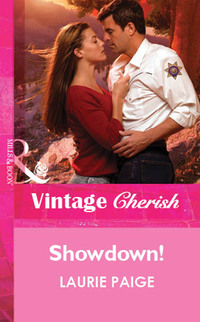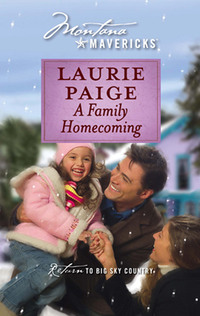
Полная версия
Something To Talk About
After taking a quick shower, she dressed in a broadcloth shirt, leaving the tails untucked, and blue slacks with an elastic waist. She pulled her damp hair through a stretchy band and secured it at the base of her neck. With pink lip gloss and a pair of white sandals she was ready.
Taking a calming breath, she marched down the steps. It wasn’t her fault, she repeated on the way, her mantra during the days, weeks, months, after Kris’s death.
Jess Fargo was where she had left him. That was a relief. She liked people who did as expected. His son had again taken up a position near the door. She felt the underlying tension between the father and son as her eyes met those of the boy.
It was like looking into her own soul. She recognized the resentment, the need to be wanted and, with it, the hope that still lingered in his young and bruised heart. Pain stitched through her in painful jabs even as she looked away and told herself she was imagining things.
Sympathy rose in her. The youngster needed something more from the man, perhaps more visible signs of his father’s love.
No! It wasn’t her business. She wouldn’t get sucked into their problems. She had found contentment. She wanted only to be left in peace. But she hated to see the boy so lost and unsure and resentful.
She sighed. There she went again—Kate, the tenderhearted, caretaker to wounded dogs, cats, humans.
Her throat closed. She had to swallow a couple of times before she could talk. “I spoke to my cousin, the police detective. She says you need a place to stay for a few days.”
“Yeah. Maybe a month.”
She frowned, then shrugged. A month wasn’t so long that their lives would become entangled. “There’s an apartment over the garage. You’ll want to see it first—”
“It’ll be fine.”
His interruption told her he didn’t care what it looked like. He needed a place to rest. Sympathy stirred again.
Jess Fargo’s problems were his own, she reminded herself sternly. Maybe this trip would work for him and his son, maybe not. She would keep her nose out of their troubles.
“I didn’t catch your name,” she said to the boy.
“Jeremy Fargo.”
“You in high school yet?” she asked. Actually, he looked to be about eleven, maybe twelve.
His smile was quick and shy and pleased. “I’ll be in sixth grade this fall.”
“He’s tall for his age,” his father put in. She watched him adjust the ice pack on his knee, then take a sip of iced tea after a glance at the empty bourbon glass.
Kate didn’t offer him more. She figured he’d had a medicinal dose and that was enough.
The words were on the tip of her tongue to invite them to dinner, though. She doubted the tough cop had shopped for groceries, and the ranch was a long way from Wind River and even farther from Medicine Bow, where a larger supermarket was located. She suppressed the invitation, knowing instinctively that this man was dangerous to her peace of mind. Hadn’t she learned anything from her marriage?
The memory of other summers flooded her heart with the bitter sadness of loss. It was a pain that never seemed to diminish but lingered always at the edges of her emotions, ready to catch her at moments of weakness.
Such as when she’d seen the scars on the detective’s knee.
Gunshot wounds. She knew them well. She knew the terror, the pain that tore through the flesh, and with it the knowledge that she had lost something more precious than her own life. She laid a hand over her abdomen where another heart had once beat with the quick expectancy of the very young.
Her child. Her son that would never be.
The emptiness rose like bile to her throat. Her arms, her heart, her home—empty of that sweet life that should have been.
Dear God, she silently pleaded, seeking relief from that terrible, terrible memory. She couldn’t go back to thinking about what might have been. With control learned at a price, she forced her thoughts to the guests in her kitchen.
Like Jess Fargo, there were scars on her flesh, but they didn’t compare to the ones in her soul.
“Come,” she said, standing abruptly, “I’ll take you to the apartment and let you get settled in.”
“I’ll get your cane, Dad,” Jeremy volunteered. He ran out, leaving a wake of silence behind him.
He was back in less than a minute. She headed out the door, leaving father and son to follow at their own pace.
Coolness eddied around her when she opened the door to the apartment. She turned on the refrigerator and hot water heater. After opening the sliding glass doors on to the deck over the garage, she stood there, letting the breeze blow over her as she gazed at the peaceful scene.
The deck commanded a wonderful view of the stock lake to the south of them, where cattle had gathered for an afternoon drink, and of snow-tipped Medicine Bow Peak to the southwest of them. Walnut trees shaded the area from the afternoon sun.
Hearing the hesitant step and the thump of the cane on the stairs, Kate again felt a tug of pity. The handsome, brooding Jess Fargo would once have bounded up those steps two at a time with the ease of a mountain elk.
Turning from the view, she noted the brief clenching of his teeth as he maneuvered up the final step and across the threshold, his grip on the cane evident. She wondered if he would ever move easily and swiftly again.
He paused, taking in everything about the apartment—the roomy kitchen, the living room through an archway, the homey furniture that had been handed down for generations.
There were also two bedrooms down a short hallway. The bathroom was tucked under the eaves at the end of the hall.
“It’s small,” she said, feeling a need to apologize.
“It’ll do.” He pulled out a chair and sat at the pine table that had belonged to her great-grandmother, his legs extended out in front of him.
“There are dishes, but I’ll have to bring you towels and linens—”
“We have sleeping bags and towels,” he cut in.
His lips were crimped at the corners, indicating pain or anger or both. She hadn’t thought about the difficulty of the steps for an injured person until he’d had to climb them.
“There’s a motel closer to town that’s reasonable in price. You wouldn’t have to go up and down steps.”
“I can handle the steps,” he informed her.
She recoiled from the bitter anger that flashed in his eyes, eyes that were the color of shadowed oak leaves, their muted green rimmed with a dark circle of gray.
“Then I’ll leave you to get settled. My number is on the pad beside the wall phone. Call if you need anything.”
“A key,” he said.
She was puzzled briefly, then she smiled tightly. “It’s on the hook by the phone. Folks rarely lock up around here.”
“That’s foolish. It can even be deadly. You don’t know who might come around.”
The disgust of the professional crime fighter at the willful stupidity of people grated over her nerves.
“Well, now that I have a police officer on the premises, I’m sure I’ll be safe.”
She flicked a glance at the son and was sorry for the tone she’d used. The boy was watching them warily, a young creature caught between two larger, opposing forces. As he’d probably been between his parents. Just a hunch, but Kate was pretty sure the parents were divorced. No wife had been mentioned.
“The fish start biting at first light,” she told him with a real smile. “The path to the lake starts at the end of the garden. Just go through the rose trellis and follow the trail. There’s a pier. Feel free to use it. Fishing poles are in the garden shed near the roses.”
“Thanks,” Jeremy said politely.
She left them to their own devices. Later that evening, sitting on the swing, she observed the light in the windows over the garage. Jeremy and his father had made several trips to the pickup truck with the camper shell. Foolish man, to torture his leg that way. She and Jeremy could have managed to bring everything up on their own.
Pride. Stubbornness. A chip on his shoulder. He was a man who needed to come to terms with life, a man who needed to reach out to his son, who had his own unfulfilled needs.
Foreboding rippled through her. A wise woman would stay out of the way of both father and son.
Chapter Two
But when had women ever been wise when it came to growing boys who, in their eyes, needed nurturing? Kate chided herself as she carried a basket of hot muffins and just-picked strawberries up the steps to the apartment. She had a mug of coffee and a pitcher of milk with her.
The door to the apartment was open when she arrived at the landing. Jess stood there, his face expressionless, but she sensed the scowl.
“I brought Jeremy some hot muffins,” she said.
A flicker of suspicion darted through his eyes, then was gone, replaced by an implacable wall of distrust that made her angry. He had levied a judgment against her for no reason, and she didn’t like it.
After an eternity he opened the screen door and let her in. “He isn’t up yet,” her new tenant informed her.
The scent of his aftershave stroked her senses. He was apparently just out of the shower, his dark hair still damp, his face smooth from a shave. He seemed as fresh as the crisp morning air that cascaded down from the lofty peaks overlooking the long, broad valley. The strain she’d noticed yesterday had eased somewhat from around his eyes. He looked rested, although not completely restored, and she realized how tired he must have been when he and his son had arrived.
Against her will, pity stirred as she stepped past him into the apartment. He had been injured in the line of duty and asked for nothing except a place to recuperate—and maybe a chance to reestablish a closeness with his son.
He wore a T-shirt and khaki shorts. His feet were bare. The bruises, the scars, the tightly stretched skin, all told of unremitting pain that had to be endured because there was no other way. The crimped lines at the corners of his mouth spoke louder than his fierce denial of need.
It was a thing she’d done for months on end—this holding back, this keeping within, all the misery that cried out from the depths of a person. She knew about things like that. Suddenly the tears were close to the surface.
Drawn against her will into a maelstrom of past emotion that she didn’t want or need, she crossed swiftly to the table and set the feast down. “I’ll just leave everything. I brought some milk.”
He made a sound that could have been a mumble of gratitude. She put the container of milk in the refrigerator. On the counter was a spoon and a jar of instant coffee.
“There’s fresh-brewed coffee, too.” She put the insulated mug on the counter beside the spoon.
“Thanks.” He waited by the door for her to leave.
The return path took her past him. Nervousness made her clumsy. She caught her sandal on the hooked rug in front of the door, causing a stumble. His arms were there to catch her in an instant, so fast that it took her completely by surprise.
The morning changed. First there had been the cold breeze, nipping into the apartment from the open door, then there was warmth all around her, like the sun enfolding her.
His hands spread heat into her arm and waist where he touched her. Through her slacks she felt the weight of his thigh pressed between hers, sending shafts of sunlight splintering through her abdomen. Her breath caught.
In the wary silence between them, she heard the sibilant hiss of air as he took a deep breath. She experienced the unexpected thundering of his heart. Unbidden yearning rushed through her, a flash point of need so powerful it left her helpless and subdued.
For the space of two heartbeats, she lingered in the embrace, unable to move. His pupils widened as his gaze locked with hers. The same terrible need blazed in him as in her.
Something inside leaped, startled as a young deer, then dipped crazily before righting itself.
They moved at the same time, drawing back, pulling away, dropping their arms, removing their hands from contact with hot, suddenly yearning flesh. The withdrawal signaled loss that she couldn’t comprehend.
He cursed under his breath.
She sighed with relief.
“Thanks for the food,” he said stiffly.
“No problem,” she replied. She fled down the steps.
“What’s this I hear about a good-looking stranger at your place?” Megan gave Kate a mock-severe stare, then spoiled it by grinning at Shannon.
Both Megan and Shannon were cousins to Kate from her mother’s side of the family. She and Megan lived on Windraven, the family ranch once managed by their grandfather. Megan lived in the big house with their grandfather, Patrick Windom, who had suffered a stroke a few years ago. Their grandfather was in a wheelchair and had rarely spoken since his son, Megan’s father, had died in an auto accident ten years ago.
“Don’t ask me,” Kate replied. “Shannon was the one who sent him and his son my way.”
“No wife?” Megan asked.
“Not that I’ve seen.”
“Ah,” Megan said in understanding.
“He’s divorced. Look, I just tried to do a favor for a fellow officer,” Shannon defended herself. “When I checked him out, the sergeant in Houston told me Jess Fargo was a hero and that he’d been shot in the line of duty, protecting an innocent bystander in the street where the shoot-out occurred. His kneecap was shattered by a bullet, and even then he managed to stop the guy from taking a woman waiting at a bus stop as a hostage. Oh, and his ex is getting married again and dumped the son on him a couple of weeks ago.”
“He has scars,” Kate said, seeing the uneven pattern of the gun wound, the neat medical incisions and the crosshatched pattern of stitches. She laid a hand over her abdomen as a sharp echo of past pain flashed through her again.
Shannon’s brow crinkled in worry. “I’m sorry, Katie, I didn’t mean to make you remember.”
“You didn’t. I’m okay.” Kate summoned a smile. “And, as usual, I felt sorry for him and his son and let them have the apartment. I’m such a sucker for a sad story.”
Remembering how she and Jess had really met, she started laughing, a little shakily but with true mirth.
“It must have been a real tear jerker,” Megan said in a wry tone. “Do tell all.”
Her cousins thought her story about tossing the hose down only to have the shut-off lever hit the ground and stick in the open position, then the man showing up with a gun, looking ready to shoot anything that crossed his path and also getting drenched, was hilarious.
“A great beginning,” Shannon said, beaming at Kate. “I predict even greater things to come.”
“Huh,” was Kate’s reaction to that.
What a trio the cousins were, Kate mused as she read absurd birthday cards and opened lovely presents—a chemise top with a lace blouse to wear over it, shorts and a shirt to go with the other two pieces, and the promised bag of cookies.
Shannon’s parents had divorced when she was a kid, so she tended to herd people into family units, although she seemed leery of matrimony for herself. Megan had had to deal with the tragedy of her mother’s strange and unhappy death from drowning, plus the quarrels between her father and grandfather, then her grandfather’s stroke after her uncle Sean’s accident. Megan wanted everyone to get along and be happy.
Kate considered her own emotional baggage. She had always had a need to heal every wounded creature she met. Life, the very act of living, could be so very complicated and serious. Her husband had accused her of having a God complex.
She had tried to help him, to bring the joy of living back into his life, but she had failed. No, it was wrong to think that way! He had chosen his path. She had chosen to live. But she had lost their child and the ability to have more.
She’d also lost something of her faith in life, she acknowledged with a familiar stab of sadness and remorse. She could forgive Kris for shooting her, then himself, but she would never forgive the loss of the baby she’d carried for seven precious months—
“What?” she said, jolted from the past by a nudge.
“I have to get back to work,” Shannon reminded them. “Some people don’t have the luxury of doing what they want, when they want. Some of us hold down a real job.”
“You love it,” Megan declared. “You’d have to, to work in the domestic crisis unit for as long as you have.”
Shannon laughed, tossed her share of the bill on the table and headed out with a wave.
“Thanks for lunch and the presents,” Kate called after her. “Lunch and presents, too,” she said to Megan as the waitress refilled their tea glasses. “I hope you didn’t blow the budget.”
“I used my own funds,” Megan informed her. “I’m training three other colts along with Wind Dancer.”
“Mmm, you’ll probably want a raise. I think we could swing one, a small one,” Kate quickly added.
As bookkeeper for the five-thousand-acre ranch, she knew to the penny what everything cost. Keeping the place going was the goal of the three cousins. After Megan’s father had died in the auto accident and their grandfather had had a stroke immediately after the funeral, the three cousins, the last of their family, had banded together and determined to keep the ranch going. It hadn’t been easy.
Megan shook her head, her bright coppery curls bouncing with each movement. “I’m fine. With the policeman there, you’ll have income from the apartment. That will help you out.”
Kate realized she’d forgotten to mention rent to her new tenant. She wondered how much he could afford. “Yes. Every dollar counts, since the price of beef dropped.”
“Wouldn’t it be nice if he spent the summer? Then you can get another teacher in there when school starts.”
“He’s only going to stay a few days, a month at the most.”
“That’s too bad.”
Kate wasn’t sure about that. “I have to run. I’m helping Rory set up his bookkeeping system.”
“Have fun.” Megan wrinkled her nose.
Bookkeeping was not Kate’s cousin’s idea of entertainment, but Kate liked it. She liked the order of numbers and the certainty of the balance sheet. She wondered if she liked those things because life had never seemed to add up, not to her. For instance, when did the good balance the bad? Shaking off the useless nostalgia, she stood. “Thanks again for the gifts.”
Kate stored her presents in the car, then drove over to the offices of Dr. Rory Daniels. Kate had known Rory all her life. After finishing veterinarian training, he had gone into partnership with Doc Bloom. He was an excellent vet and an expert on horses, advising Megan on the ranch breeding program.
Tall, racehorse trim, a year behind her in age, he had coal-black hair and light-blue eyes. While she explained the bookkeeping entries on the new computer system to him and his secretary, she noticed how handsome he was…but she kept seeing Jess Fargo….
When Kate returned home in the late afternoon, she found the coffee mug and milk pitcher on her back steps, along with a check for a month’s rent for the same amount she’d charged the teacher. He must have asked Shannon the rental price.
From her upstairs bedroom she could see Jeremy at the lake, sitting on the pier and staring into the water, looking forlorn. After changing clothes, she dug up some fishing worms and headed for the path to the lake with two poles.
“Hi,” she called out before stepping on the rough planks.
The boy’s head snapped around. For a moment she saw his misery, then the shy grin appeared. Her heart clenched in pity. Kids were hurt the most when a marriage failed.
He probably felt left out now that his mom had decided to remarry and had packed him off to his father.
“You from Houston, too?” she asked.
“Yeah.”
“Going to be a cop?”
He cast her a startled glance, then shrugged.
“I thought my cousin was loony when she went into police work, but she seems to like it and she’s good. The world needs people like that. Is your dad a good cop?”
Jeremy appeared shocked that she would ask. “The best,” he told her. “He got a medal from the mayor for saving a woman’s life even after he was shot.”
She nodded. The son’s pride in his dad and his admiration for the man were obvious. There was respect, too. That was good, but the youngster was lonely. His eyes, the same shadowy green as his father’s held emotion too deep for one so young. He’d seen a lot of life, this kid who tugged at her heart. She sighed and looked away.
The relationship between the father and son was none of her business, she reminded herself. Stay out of it.
But there was one other thing she wanted to say to her young guest. “My mother died when I was a senior in high school. When my dad remarried a couple of years later, I resented it. I thought it was somehow a betrayal of my mother, but I realized that life goes on, you know?”
Jeremy ducked his head and studied the water lapping against the posts of the pier. He nodded jerkily.
“I felt left out of their happiness. It was kind of hard until I got used to the idea. I was sort of lost and lonely.”
“My mom’s boyfriend doesn’t want me around,” he blurted out, his voice breaking on an upward note of distress.
“Hmm.” She waited a long minute. “He probably thinks the same about you—that you don’t want him around. Maybe he’s worried that she loves you more than she loves him. People are like that, you know, sort of insecure about things.”
A frown, very like his father’s, appeared on the smooth brow of the youngster. She figured she had given him enough to digest for now. Besides, she didn’t want to get involved with anyone else’s problems, especially those of a hardheaded detective who would be out of her life in a few weeks.
“I dug up some worms,” she mentioned casually, picking up one of the rods. “I have an extra spinning outfit.”
She put a worm on the hook and cast into the lake. Hardly a minute went by before she had a bite. “Bluegills. They get hungry about this time of day.”
Jeremy watched her catch a fish before he picked up the rod and tried his luck. He lost a half dozen worms before he caught on. When he brought his first fish in and removed it from the hook, she saw a different person, one who was laughing and excited and happy, the way a youngster his age should be.
“Hey, that’s a big one, a seven- or eight-incher. I think we’ll have fresh fish for supper tonight.”
The sober expression returned. “I don’t know if my dad knows how to cook fish.”
“No reason for him to have to. A person should be able to cook his own catch, my dad always said. We’ll fry ’em up at my place and invite your father to join us. Okay?”
His grin was huge. She saw the father reflected in the son, when Jess Fargo had been young and idealistic and enthusiastic about life. A sense of sorrow overcame her. She shook it off. Jess Fargo wasn’t her problem.
“Yes, ma’am,” Jeremy said. “Yeah, that would be great.”
“I’m Kate to my friends.”
No matter what she told herself for the next hour, she knew she was being pulled in like the fish on the end of her line. But there was a kid involved, and where kids were concerned, well, she couldn’t help but worry. So maybe she and Jeremy could be friends while he was there.
She counted the fish on their stringer. “We have enough. Let’s clean them.”
The boy followed as she led the way back to the garden and the compost heap. She removed a knife from her pocket and, on a big flat rock, cleaned her share of the catch, tossing the fish heads into a hole she dug at the edge of the compost. When she handed the knife to him, he followed her example.
At the house she dipped her fish into egg beaten with milk, then into cornmeal. While he got his share ready, she fried her catch in oil, then let him do the same.
“You want to invite your dad to join us?” she asked when she had fries and a salad ready to go with the fish.









